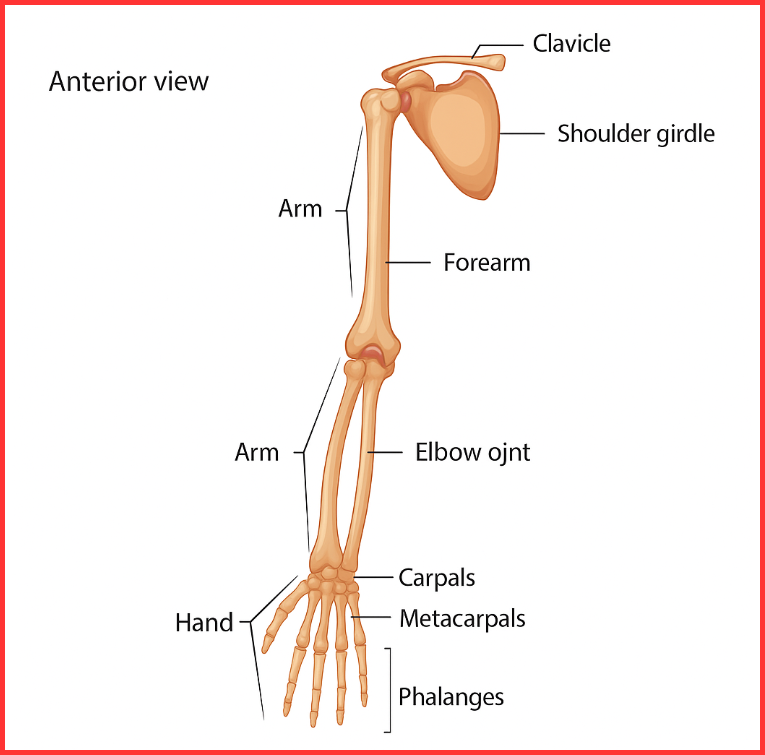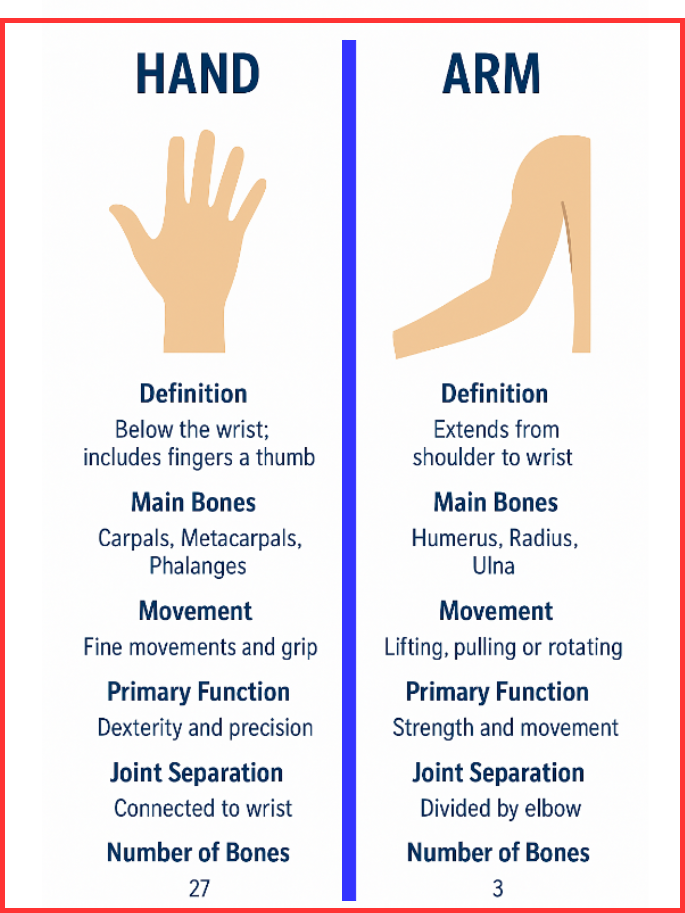The difference between hand and arm is often misunderstood by many people. Some believe that the area from the fingers to the elbow is the hand, and the part from the elbow to the shoulder is the arm. This assumption is incorrect. In human anatomy, both the hand and the arm are distinct structures with unique functions, bones, and muscles. Let’s explore their exact differences and characteristics.
What is an Arm?
In human anatomy, the arm is divided into two major sections — the upper arm and the forearm. The upper arm extends from the shoulder to the elbow, mainly responsible for lifting, pulling, and supporting body strength. The forearm lies between the elbow and the wrist, enabling movement, grip strength, and hand rotation.
The elbow acts as a hinged joint, allowing the arm to bend and straighten up to 180 degrees. The arm is made up of three major bones — the humerus, radius, and ulna. The humerus is the large bone of the upper arm connected to the radius and ulna at the elbow joint. Known for its toughness, the humerus can endure heavy loads before breaking.
Muscles in the arm are divided into anterior and posterior compartments by the lateral and medial intermuscular septa, also called fascial layers. These muscle groups help in different arm movements.
Important muscles include the brachioradialis, which helps rotate the hand, and the deltoid, which covers the shoulder and assists in arm lifting.
What is a Hand?
The hand is the section below the wrist, designed for gripping, holding, and performing precise tasks. It can rotate, bend, and move in various directions due to its intricate bone and joint structure. A typical human hand has four fingers and one thumb.
Primates such as chimpanzees, monkeys, and lemurs also have hands, but the human hand is unique because of its opposable thumbs and fingerprints, allowing for fine motor control.
A human hand consists of 27 bones — 14 phalanges (finger bones), 5 metacarpals (connecting the fingers to the palm), and 8 carpals (wrist bones).
Beyond physical functions, the hand plays an essential role in communication, such as sign language or gestures. The term “hand” is also used in everyday expressions — for instance, “lend a hand” means to help someone, while “hand me that” means to give something.
Key Differences Between Hand and Arm
Definition
- Hand: The part below the wrist containing four fingers and a thumb.
- Arm: The section from the shoulder to the wrist, divided into the forearm and upper arm by the elbow.
Bone Composition
- Arm: Comprises three major bones — humerus, radius, and ulna. The humerus connects the shoulder and the elbow, forming a strong structural base.
- Hand: Contains 27 bones in total — 8 carpals, 5 metacarpals, and 14 phalanges. These bones allow for flexible movement and grip precision.
Function
- Hand: Performs fine motor activities such as holding, writing, and gesturing. It can rotate and flex easily due to its complex bone structure.
- Arm: Responsible for broader movements like lifting, pulling, and supporting physical actions.

Comparison Table: Hand vs Arm
| Aspect | Hand | Arm |
| Definition | Below the wrist; includes fingers and thumb | Extends from shoulder to wrist |
| Main Bones | Carpals, Metacarpals, Phalanges | Humerus, Radius, Ulna |
| Movement | Fine movements and grip | Lifting, pulling, and rotating |
| Primary Function | Dexterity and precision | Strength and movement |
| Joint Separation | Connected to wrist | Divided by elbow |
| Number of Bones | 27 | 3 |

Summary: Hand vs Arm
To summarize the difference between hand and arm —
The hand lies below the wrist and includes four fingers and a thumb, responsible for precision and dexterity.
The arm extends from the shoulder to the wrist, divided into two parts — the upper arm and the forearm — mainly responsible for lifting and pulling. While the arm provides strength and range of motion, the hand allows delicate control and fine motor skills essential for daily activities and communication.
References:
- Anatomy of the Hand & Wrist: clevelandclinic.org
- ‘Arm’– Wikipedia
- ‘Hand’– Wikipedia
Read Next: